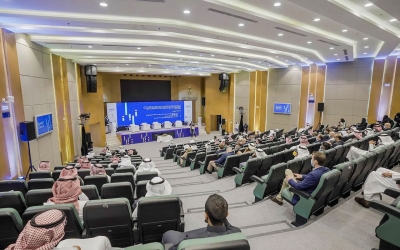
Comprehensive Strategy for the Real Estate Sector
The Comprehensive Strategy for the Real Estate Sector is a strategy designed to develop the real estate sector in the Kingdom of Saudi Arabia. Formulated by the Real Estate General Authority, it is built upon four pillars: Governance of the real estate sector, enabling and sustaining the real estate sector, market effectiveness, and serving partners. The strategy was approved by the Council of Ministers in 2020.
Comprehensive Strategy for the Real Estate Sector objectives
The Comprehensive Strategy for the Real Estate Sector is built on four pillars, prioritizes fifteen goals and eighteen initiatives, and is linked to twenty-two measurement indicators.
The strategy aims to regulate and improve the supervision mechanisms of the real estate sector, enhance its efficiency, encourage investment, increase its contribution to the gross domestic product (GDP), improve the performance of real estate establishments, particularly the small and medium enterprises, enhance the quality of tools they use and services they provide, and expand job opportunities for young men and women in various fields within the real estate sector.
The Comprehensive Strategy for the Real Estate Sector also provides significant support to the overall economic system and the real estate sector in particular. It recognizes the real estate sector as a key driver for fostering development and attracting investments, actively contributing to the GDP, and creating job opportunities for national talents within real estate establishments to attain the strategy vision. The strategy envisions the real estate sector in the Kingdom as vibrant, attractive, and distinguished by trust and innovation.
Pillars of the Comprehensive Strategy for the Real Estate Sector
This pillar focuses on three main priorities: Proposing laws and legislations, issuing regulations and policies, developing governance models, creating effective communication plans, and improving supervision mechanisms. To address these priorities, the Real Estate General Authority has established a comprehensive set of legislations, including the Comprehensive Strategy for the Real Estate Sector, the Real Estate Brokerage Law, the Law of Real Estate Registration, the Real Estate Contribution Law, amendments to the regulations of the Real Estate General Authority, and the Law of Real Estate Units Ownership, Subdivision, and Management. To achieve these goals, the Real Estate General Authority has prepared regulations for real estate auctions, controls for electronic marketing and real estate advertisements, and criteria and controls for licensing real estate consulting and market analysis services. It also oversees the Committee for Correcting Real Estate Ownership Registration Errors, chairs the Committee for Failed Real Estate Contributions, leads the Steering Committee for the Developer Services Center (Etmam), and the Off-Plan Sales Committee.
Enabling and sustaining the real estate sector
For this pillar, the Real Estate General Authority has set priorities to enhance the real estate market transparency, develop and build human resources, improve the efficiency of services provided to the sector, improve the quality of fee and tax structures, and establish procedures for the sustainability of real estate assets. To achieve these goals, the Real Estate General Authority launched five initiatives: The first initiative involves creating a real estate database, which includes a platform for real estate indicators showing twenty-five price and non-price indicators covering thirteen provinces in the Kingdom and five major cities with their neighborhoods. The authority also issued standards for classifying real estate brokerage establishments according to its requirements and established a geospatial real estate portal. The second initiative focuses on developing training supervision and setting standards for the qualification, accreditation, and classification of all real estate professionals. Represented by the Saudi Real Estate Institute, the authority developed twenty-nine training programs across various real estate fields and recognized freelance work documents for real estate workers in collaboration with the Ministry of Human Resources and Social Development. The third initiative involves establishing a real estate asset sustainability plan, which includes issuing rules for accrediting service providers for the Sustainable Building Program and training Saudi engineers in inspecting both ready and under-construction buildings. The fourth initiative includes activating the "Mullak" system, issuing Implementing Regulations of the Law of Real Estate Units Ownership, Subdivision, and Management, as well as a Guiding Law for the Owners' Associations and Complex Societies. The authority oversees the implementation of this law and its Implementing Regulations to organize relationships within residential complexes and buildings, encouraging co-living and preserving real estate assets.
Market effectiveness
This pillar prioritizes land and property registration and the implementation of laws and regulations. To achieve this goal, the Real Estate General Authority launched three initiatives: The first initiative involves creating a central registry for land and property, where the authority prepared a new real estate registration law and developed an electronic platform for real estate registration that technically links all relevant entities, including the Ministries of Justice, Municipalities and Housing, and the Real Estate General Authority. The second initiative focuses on establishing an audit and implementation mechanism, wherein the authority founded a Compliance Department responsible for supervising and monitoring real estate activities to ensure quality execution and adherence to regulations.
Partners service
This pillar includes nine priorities: Improving dispute resolution mechanisms, developing marketing and sales programs, enhancing land and property registration procedures, ensuring the reliability of real estate transactions, and developing services for citizens, investors, developers, and real estate service providers. To achieve this pillar, the authority has launched several initiatives, including the establishment of the Real Estate Arbitration Center, inaugurated by the Minister of Justice and the Minister of Municipalities and Housing. This center has started its tasks in resolving disputes for beneficiaries of the Ejar and Mullak programs, either through reconciliation or arbitration. Other initiatives of partners service include developing procedures and policies for resolving real estate disputes, organizing sales and marketing activities for real estate projects, protecting real estate rights, organizing planning and approval processes, developing regulations for off-plan sales projects and real estate contributions, and organizing rental monitoring mechanisms.
Related quizzes
Related articles

